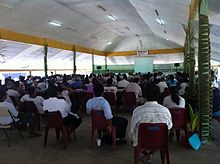

The heart of any Kiribati community is its maneaba or meeting house. The maneaba is not just the biggest building in any village, it is the centre of village life and the basis of island and national governance.
A traditional maneaba is an imposing structure, with slabs of coral supporting a huge roof formed from coconut wood, held together with coconut string and thatched with pandanus leaves. The whole community is involved in its construction, and every aspect of the maneaba has a symbolic as well as a practical function.[1]
A maneaba serves a similar cultural role to a Polynesian marae. In the neighbouring islands of Tuvalu (formerly called the Ellice Islands), the meeting house is called the maneapa.[2] The sharing of the name is the result of Kiribati and Tuvalu being previously the British crown colony of the Gilbert and Ellice Islands.
The House of Assembly (Kiribati) or Government of Kiribati is referred to as the Maneaba ni Maungatabu, or maneaba of the Sacred Mountain.
Bibliography
- Maude, H. E. (1977), The evolution of the Gilbertese boti. An ethnohistorical interpretation, Institute of Pacific Studies and Gilbert Islands Extension Centre of the University of the South Pacific, Suva (First printed: Polynesian Society, Wellington 1963).
- Maude, H. E. (1980), The Gilbertese maneaba, The Institute of Pacific Studies and the Kiribati Extension Centre of the University of the South Pacific, (Suva).
- Lundsgaarde, Henry P. (1978), Gunson, Niel (ed.), "Post-contact changes in Gilbertese maneaba organization", The Changing Pacific. Essays in Honour of H. E. Maude, Melbourne: Oxford University Press, pp. 67–79, ISBN 0-19-550518-2.
References
- ^ Whincup, Tony (2009). Kiribati Book/Bwai ni Kiribati. Steele Roberts. ISBN 978-1-877448-80-5.
- ^ Lambert, Sylvester M. "Meeting house on Nanumea, Tuvalu, called the aahiga or maneapa". Special Collections & Archives, UC San Diego. Retrieved 25 January 2017.








